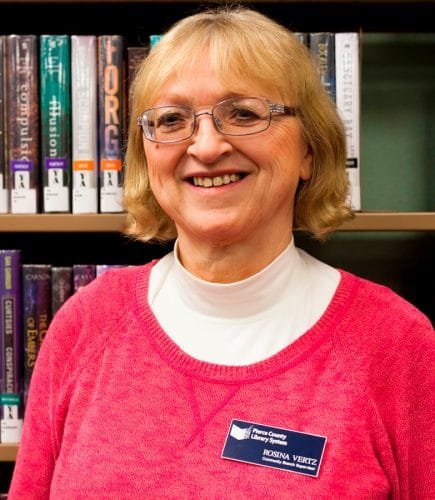 Ever-smiling Rosina Vertz has been a vital part of our community. Photo: Anna Brones, KP News
Ever-smiling Rosina Vertz has been a vital part of our community. Photo: Anna Brones, KP News
If it weren’t for a day of nice weather, the Key Peninsula may never have met one of its notable community members, Rosina Vertz, community branch supervisor of the Key Center Library, who will retire at the end of February after almost three decades working in the Pierce County Library System.
It was 1990, and Vertz, originally from a small town in Southern Germany, had burned out as a local preschool teacher. When the new school year started in the fall, she decided to take a break. While visiting the Gig Harbor Library one December afternoon, she spotted a job listing and took an application form.
The completed application had to be submitted at the main library office in Tacoma. Vertz, who didn’t enjoy driving over the Tacoma Narrows Bridge, told herself, “If it doesn’t rain, I will take it in.” Fortunately, it didn’t rain that day, and when she was selected to come in for an interview, it didn’t rain that day either.
Vertz was hired, and began working at the Gig Harbor Library as a page, checking in books and stacking shelves. In 1991, a position opened up at the Key Center Library, and she began to split her time between the two. After a short break to go back to school for general studies at Tacoma Community College, she came back to the library, soon settling full time at the Key Center branch in 2005.
Her work within the Pierce County Library System, spanning almost three decades, has been about far more than books. “In our system, librarians do more than traditional reference librarians,” says Vertz. Library staff “don’t just sit and answer questions; that went out the window a long time ago—along with the ‘sshh,’” she said. Library staff are just as likely to help someone find a book as they are assisting a computer user with a Microsoft Word document or community event planning. Vertz hailed this major shift in the library system for its significant impact on the library as a community hub.
“One of the real turning points was the focus on customer service,” Vertz said. “There was this perception of the library being special, that you have to behave a certain way, that might have intimidated people.”
In the early 2000s, the library system shifted to provide better customer service, training staff to focus on the needs of the community. As a library supervisor, Vertz understood the importance of being “really engaged with the people in the community,” she said. For example, Vertz has been a longtime member of the Key Peninsula Business Association.
In a rural community like the Key Peninsula, the library is more than a place to borrow books. It is a free and accessible place, open to anyone. “The Key Peninsula community values the library,” Vertz said. She proudly points out that it’s a systemwide policy “to be accessible… as a person and as an institution.”
Libraries come with a rich history—starting right after humans created the first books. History’s most notable library was perhaps the one in Alexandria, constructed in the 3rd century B.C. In the United States, libraries date back to the mid 1700s, among them Benjamin Franklin’s membership library, the Library Company of Philadelphia. Public libraries soon followed. The Peterborough Town Library, established in 1833, is the oldest tax-supported library. The nation’s first large public library, the Boston Public Library, opened in 1848.
Today, public libraries are an essential part of a civilized, literate and educated society. They are a place that community members can go to, no matter who they are or what their background is, and have free access to a world of ideas. The Key Center branch is no different. “Our credo is free access to information,” Vertz said. “That’s a democratic principle.”
Local community members depend on the library as an open forum for information. For instance, it offers its walls as a gallery space for artists to display their work, and Vertz has worked with local organizations like Two Waters Arts Alliance to host juried shows. There are early learning programs for children, called “block parties,” a nod to the simple yet enriching childhood toy. The collection of diverse events and programs that Vertz and her team have cultivated “are enriching to the cultural life of the community,” says Vertz.
While the Key Center Library will continue to serve as a lively community asset, as its mainstay representative and advocate, Vertz will certainly be missed. She looks forward to more time in her garden and more time to read. She will look back at her time at the Key Peninsula Library fondly, not just for her work achievements, but for the people involved.
“I always enjoyed working here. It was a good place to work, a good community to work in and with,” she said.
UNDERWRITTEN BY THE FUND FOR NONPROFIT NEWS (NEWSMATCH) AT THE MIAMI FOUNDATION, THE ANGEL GUILD, ADVERTISERS, DONORS AND PEOPLE WHO SUPPORT INDEPENDENT, NONPROFIT LOCAL NEWS